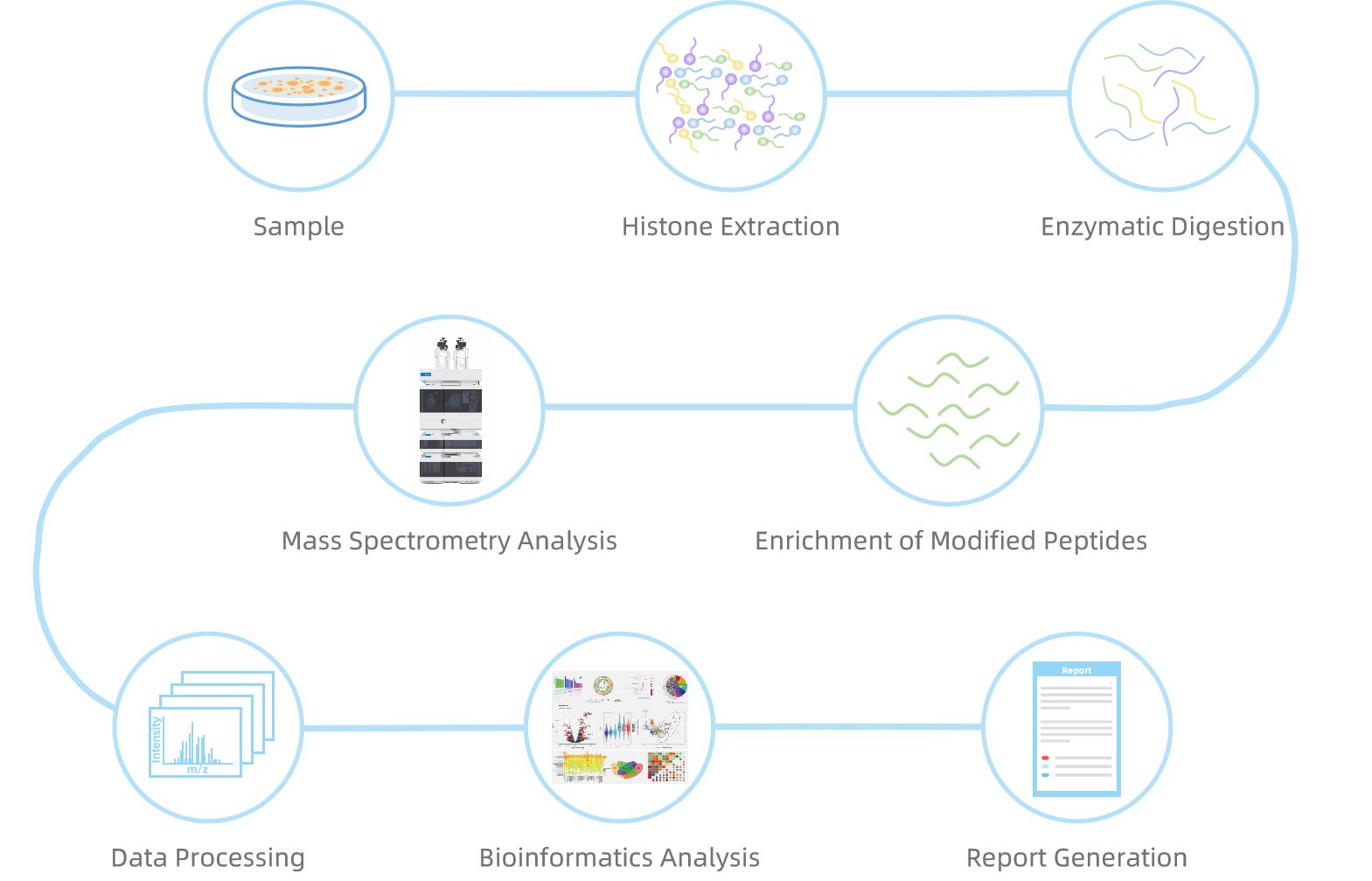Histone Symmetric Dimethylation Analysis
- Animal tissue ≥ 2 g
- Plant tissue ≥ 0.4 g
- Serum / Plasma ≥ 2 mL (plasma should be collected using EDTA as an anticoagulant)
- Urine ≥ 10 mL
- Cell ≥ 1 x 10⁸ cells
- Yeast / Microbial samples ≥ 0.4 g
- Protein samples: 2-5 mg (Standard tissue or cell lysis buffers can be used during protein extraction)
Histone symmetric dimethylation is a crucial post-translational modification that significantly influences gene expression, chromatin structure, and cellular function. This modification involves the addition of two methyl groups to specific lysine or arginine residues on histones, resulting in a symmetric configuration. The process of symmetric dimethylation is catalyzed by histone methyltransferases (HMTs), which utilize S-adenosylmethionine (AdoMet) as a methyl donor.
Key residues targeted by symmetric dimethylation include H3R2 and H4R3. Notably, the symmetric dimethylation of H4R3 has been linked to histone deacetylation, a process essential for maintaining properly polarized cell growth. This relationship underscores the importance of symmetric dimethylation in regulating cellular growth patterns and maintaining cellular homeostasis. Additionally, H3R2 symmetric dimethylation has emerged as a newly identified histone mark that plays a critical role in the maintenance of euchromatin, the less condensed form of chromatin associated with active gene transcription. This modification supports an open chromatin structure, facilitating the recruitment of transcription factors and enhancing gene expression.
Dysregulation of histone symmetric dimethylation is associated with various diseases, particularly cancer. Altered expression or activity of HMTs and the aberrant presence of symmetric dimethylation marks can lead to the silencing of tumor suppressor genes and the activation of oncogenes, contributing to tumorigenesis. Understanding the precise roles and mechanisms of symmetric dimethylation can provide valuable insights into the molecular underpinnings of these diseases.
Services at MtoZ Biolabs
MtoZ Biolabs utilizes Thermo Fisher's Q Exactive HF, Orbitrap Fusion, and Orbitrap Fusion Lumos mass spectrometry platforms, in combination with Nano-LC, to provide a comprehensive solution for histone symmetric dimethylation analysis. Simply provide your experimental objectives and send us your samples, and we will offer you a one-stop service from sample preparation and MS analysis to data analysis, delivering detailed identification and quantitative analysis of histone symmetric dimethylation modifications and their modification sites.
Compared to traditional proteomics analysis, the key to histone modification analysis lies in the isolation and purification of histone components, as well as mitigating the impact of N-terminal lysine on the analysis of histone post-translational modifications. Since histones are located in the cell nucleus, MtoZ Biolabs has developed a specialized platform for histone extraction and purification, drawing on existing literature and experimental experience. Cells are homogenized and subjected to low-speed centrifugation to obtain the nuclei. The nuclei are then further disrupted to release histones and DNA. High-salt buffer is used to remove impurities, and High-Performance Liquid Chromatography (HPLC) is employed to separate different histone components, achieving optimal purity for subsequent mass spectrometry analyses. Additionally, to eliminate the impact of N-terminal lysine, we utilize 2-3 different enzymes to enhance peptide coverage in mass spectrometry analysis during the digestion process. This multi-enzymatic digestion increases the coverage of histone peptides, preventing the loss of post-translational modification information due to unsuitable peptide lengths or low ionization efficiency.
Analysis Workflow

Service Advantages
1. Advance Analysis Platform
Mtoz Biolabs established an advanced histone symmetric dimethylation analysis platform, guaranteeing reliable, fast, and highly accurate analysis service.
2. One-Time-Charge
Our pricing is transparent, no hidden fees or additional costs.
3. High-Data-Quality
Deep data coverage with strict data quality control. AI-powered bioinformatics platform integrate all histone symmetric dimethylation analysis data providing clients with acomprehensive data report.
4. Optimized Extraction
An optimized histone extraction and purification protocols are employed to minimize contamination and ensure high purity.
Sample Submission Requirements
1. Sample Volume
2. Sample Preservation
Samples should be shipped with dry ice. Avoid repeated cycles of freezing and thawing
Note: We will conduct testing on the provided samples. The formal experiment will commence only after the samples pass the quality check.
Deliverables
1. Comprehensive Experimental Details (Materials, Instruments, and Methods, etc.)
2. Relevant Liquid Chromatography and Mass Spectrometry Parameters
3. Detailed Information on Histone Symmetric Dimethylation Analysis
4. Raw Data
5. Mass Spectrometry Image
6. Custom Analysis Report
MtoZ Biolabs, an integrated Chromatography and Mass Spectrometry (MS) Services Provider, provides advanced proteomics, metabolomics, and biopharmaceutical analysis services to researchers in biochemistry, biotechnology, and biopharmaceutical fields. Our ultimate aim is to provide more rapid, high-throughput, and cost-effective analysis, with exceptional data quality and minimal sample consumption. If you are interested in our histone symmetric dimethylation analysis services, please feel free to contact us. We are dedicated to providing you with the best service.
MtoZ Biolabs, an integrated chromatography and mass spectrometry (MS) services provider.
Related Services
Histone Monomethylation Analysis
How to order?







